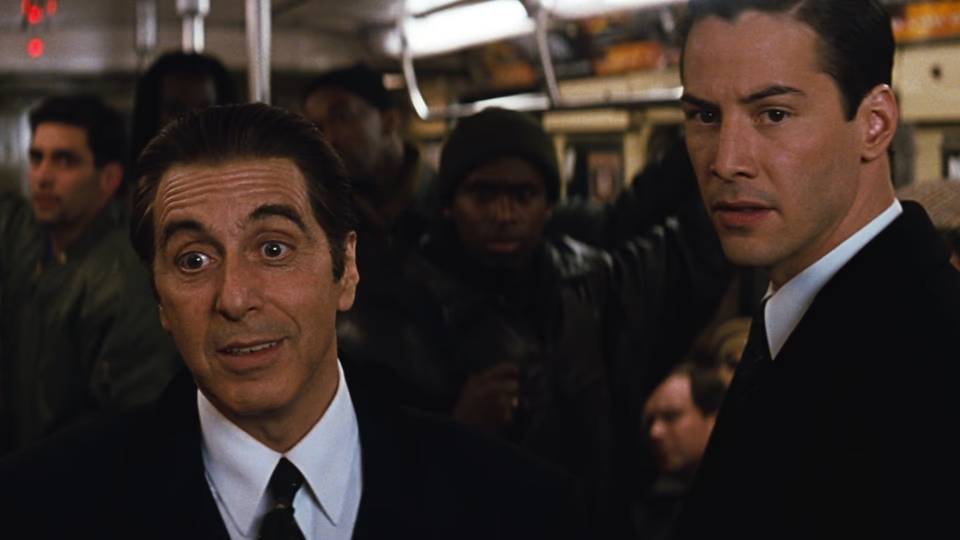The Devil's Advocate

Even in 1997 there was something old-fashioned about The Devil’s Advocate, which plays like The Firm crossed with Rosemary’s Baby, with a dash of Wall Street thrown in for good measure. Even as Scream was gentrifying the slasher picture, here was a throwback to the kind of pictures major studios hadn’t produced in decades, a big-budget horror film for adults, full of sex, violence, and damnation, yet polished to a commercial sheen with A-list stars to make its excesses go down smooth.
The picture opens in Florida, where Keanu Reeves plays a defense attorney who’s never lost a case. When we first see him, he’s defending a child molester in court, and though he knows his client is guilty, he brutalizes the young victim on the stand until she breaks down. It’s a sequence that wouldn’t feel out of place in one of those cynical ’70s pictures about the corruption of American institutions. But here it’s just the appetizer.
Reeves, often maligned for his limited range, is perfectly cast. His earnest, somewhat blank quality works for a character who’s meant to be corruptible, who’s hiding his own moral vacuum behind a facade of righteousness. He’s not movie-star handsome enough to seem implausible as a Florida attorney, but carries enough charisma to convince as an undefeated litigator. When Al Pacino’s New York law firm comes calling, Reeves takes his wife (Charlize Theron) to the big city, where the real show begins.
Pacino, as the head of the firm, plays a variation on his character from Heat, but turned up to eleven. He doesn’t chew the scenery, he devours it. His character is both serpent and puppet master, constantly smoking (along with seemingly everyone else at the firm—a nice touch), always emerging from underground subway stations like some creature from the depths. Pacino plays him as a demon who’s grown bored with evil and now treats it as performance art. Watch him lip-sync to Frank Sinatra, or casually destroy a young tough on the subway by revealing his wife’s infidelity in rapid-fire Spanish. “Invigorating!” he roars afterward, and we believe him.
But the picture stumbles with its treatment of Theron’s character. She starts strong as a small-town beauty queen type who might actually have an interesting arc in the big city. Instead, the script (credited to Jonathan Lemkin and Tony Gilroy, though the sharp legal dialogue has Gilroy’s fingerprints all over it) turns her into a knock-off of Mia Farrow from Rosemary’s Baby. She’s gaslighted into madness over what feels like a long weekend, wailing “I was all alone!” after Reeves steps out of a party for a business meeting. It’s a shame, because Theron proves convincing in both modes—she just needed better connective tissue between them.
She’s a casualty of the gleeful exploitation movie hiding inside this big-budget wrapper, complete with Rick Baker’s practical effects (which mostly hold up) and a nihilistic streak that modern studio pictures would never dare. The film revels in its R-rating, offering both titillation and horror, often in the same scene. The New York location shooting adds grit and specificity, even if continuity occasionally suffers (watch how quickly that snowstorm disappears).
Sure, the film’s final descent into apocalyptic imagery might be over-the-top, but by then you’re either on board or you’re not. When Pacino finally unleashes his climactic monologue about God as “an absentee landlord,” you’ll either roll your eyes or lean forward in your seat. I did both, and enjoyed myself immensely either way.
Indeed, they really don’t make them like this anymore. Today, it would be noted to death for fear of offending the audience. For better or worse, The Devil’s Advocate is a reminder of what Hollywood used to dare to put on screen.